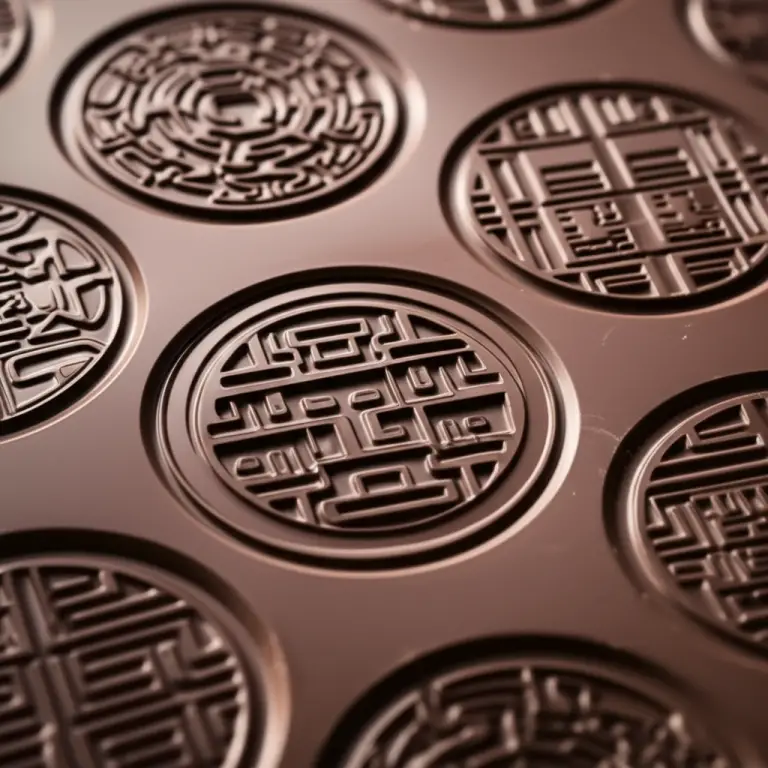Support our educational content for free when you purchase through links on our site. Learn more
7 Key Chocolate Compounds That Could Boost Longevity 🍫 (2026)
Did you know that your favorite indulgence—chocolate—might just hold the secret to a longer, healthier life? It’s not just a sweet treat; hidden within those rich, velvety squares are powerful compounds that scientists are increasingly linking to longevity and anti-aging benefits. From ancient civilizations savoring cacao’s mystical powers to modern research uncovering its antioxidant arsenal, chocolate’s story is as fascinating as its flavor.
In this article, we’ll unwrap the 7 key compounds in chocolate that might promote longevity, including flavanols, theobromine, polyphenols, and essential minerals. We’ll also explore how different types of chocolate stack up, how much you should enjoy daily, and bust some common myths along the way. Ready to discover whether chocolate could be your next superfood? Keep reading—we promise it’s sweeter than you think!
Key Takeaways
- Flavanols and polyphenols in dark chocolate act as potent antioxidants that combat oxidative stress and inflammation, key drivers of aging.
- Theobromine, a mild stimulant in chocolate, may improve mood and support cardiovascular health, contributing to longevity.
- Magnesium and essential minerals found in chocolate help regulate vital bodily functions linked to aging.
- Dark chocolate (≥70% cacao) offers the most health benefits compared to milk or white chocolate.
- Consuming 10–20 grams daily of high-quality dark chocolate is recommended to balance health benefits and calorie intake.
- Pairing chocolate with vitamin C-rich foods can enhance absorption of longevity-promoting compounds.
- Not all chocolate is created equal—choose minimally processed, non-alkalized dark chocolate for maximum benefits.
Ready to indulge wisely and boost your longevity? Dive into our detailed guide to learn which chocolates make the cut and how to enjoy them for the sweetest health boost!
Table of Contents
- ⚡️ Quick Tips and Facts About Chocolate and Longevity
- 🍫 The Fascinating Journey: Chocolate’s Longevity-Boosting Compounds Through History and Science
- 1. Flavanols: The Antioxidant Powerhouses in Chocolate
- 2. Theobromine: More Than Just a Mild Stimulant for Longevity
- 3. Polyphenols: Nature’s Secret Weapon Against Aging
- 4. Magnesium and Essential Minerals: The Unsung Heroes in Chocolate
- 5. Serotonin Precursors: Chocolate’s Mood-Boosting Magic and Longevity Link
- How Dark Chocolate Stands Out: Longevity Benefits Compared to Milk and White Chocolate
- Chocolate and Heart Health: What Cutting-Edge Research Reveals
- Can Chocolate Combat Inflammation and Oxidative Stress? The Science Explained
- How Much Chocolate Is Just Right? Expert Guidelines for Longevity
- Chocolate Myths Busted: Separating Sweet Facts from Fiction
- Tasting Notes: Our Top Chocolate Brands That Boost Longevity
- Chocolate Pairings That Maximize Health Benefits
- DIY Delight: Crafting Your Own Longevity-Enhancing Chocolate Treats
- Conclusion: Is Chocolate the Sweet Elixir of Life?
- Recommended Links for Deep-Dive Chocolate and Longevity Research
- FAQ: Your Most Pressing Questions About Chocolate and Longevity Answered
- Reference Links: Trusted Sources Behind Our Chocolate Longevity Insights
Quick Tips and Facts About Chocolate and Longevity
As we delve into the world of chocolates at Chocolate Brands, specializing in Indulge in the World of Chocolates, let’s start with some quick tips and facts. According to a study on longevity studies on chocolate, dark chocolate, in particular, contains compounds that may promote longevity. Here are some key points to consider:
- Dark chocolate ≥70% cacao is optimal for longevity benefits.
- Portion control: 10–20 g daily is recommended to balance benefits and calorie intake.
- Timing: Consume before 3 pm to avoid sleep disruption from theobromine.
- Heat: Melting below 50°C preserves flavanols.
- Pair with vitamin C (berries, citrus) to regenerate epicatechin.
The Fascinating Journey: Chocolate’s Longevity-Boosting Compounds Through History and Science
Chocolate has been a part of human culture for thousands of years, with its origins dating back to the ancient civilizations of Mesoamerica. The journey of chocolate from a bitter drink to the sweet treat we know today is fascinating. But what makes chocolate so special in terms of longevity? Let’s dive into the science behind it.
Introduction to Key Compounds
Chocolate contains several compounds that have been linked to longevity, including:
- Flavanols: Potent antioxidants that support cardiovascular health and reduce oxidative stress.
- Theobromine: A gentle stimulant that can help improve mood and reduce cortisol levels.
- Polyphenols: A class of compounds that act as antioxidants and may help reduce inflammation.
1. Flavanols: The Antioxidant Powerhouses in Chocolate
Flavanols are one of the most well-studied compounds in chocolate. They have been shown to have a positive impact on cardiovascular health by:
- Improving blood flow
- Lowering blood pressure
- Reducing oxidative stress
Some of the best sources of flavanols include:
- Valrhona Abinao 85%: 180 mg flavanols/20 g
- Ghirardelli 86% Twilight: 170 mg flavanols/20 g
- Navitas Organic Cacao Powder: 150 mg flavanols/ tbsp
You can find these products on Amazon or visit the Valrhona official website for more information.
2. Theobromine: More Than Just a Mild Stimulant for Longevity
Theobromine is another compound found in chocolate that has been linked to longevity. It can help:
- Improve mood
- Reduce cortisol levels
- Support cardiovascular health
Some of the top sources of theobromine include:
- Crio Bru Ghana Light Roast: 350 mg per 250 ml cup
- Green & Black’s 70%: 200 mg per 30 g serving
You can find these products on Amazon or visit the Green & Black’s official website for more information.
3. Polyphenols: Nature’s Secret Weapon Against Aging
Polyphenols are a class of compounds that act as antioxidants and may help reduce inflammation. They can be found in a variety of foods, including chocolate. Some of the key benefits of polyphenols include:
- Reducing oxidative stress
- Improving cardiovascular health
- Supporting cognitive function
Some of the best sources of polyphenols include:
- Original Beans Piura Porcelana 74%
- Taza 87% stone-ground
You can find these products on Amazon or visit the Original Beans official website for more information.
4. Magnesium and Essential Minerals: The Unsung Heroes in Chocolate
Magnesium and other essential minerals are often overlooked when it comes to chocolate. However, they play a crucial role in maintaining overall health and supporting longevity. Some of the key benefits of magnesium include:
- Supporting heart health
- Regulating blood pressure
- Promoting bone health
Some of the best sources of magnesium include:
- Dark chocolate ≥70% cacao: 20 g provides
60 mg magnesium (15% daily need) - Nuts and seeds: Almonds, cashews, and pumpkin seeds are all good sources of magnesium
You can find these products on Amazon or visit the American Chocolate Brands page for more information.
5. Serotonin Precursors: Chocolate’s Mood-Boosting Magic and Longevity Link
Serotonin precursors, such as tryptophan, can help improve mood and reduce stress levels. Chocolate contains several compounds that can help support serotonin production, including:
- Tryptophan: An amino acid that serves as a precursor to serotonin
- Phenylethylamine: A natural mood elevator
Some of the best sources of serotonin precursors include:
- Hu Kitchen Salty 70%
- Pana Organic Raw Cacao & Goji 60%
You can find these products on Amazon or visit the Hu Kitchen official website for more information.
How Dark Chocolate Stands Out: Longevity Benefits Compared to Milk and White Chocolate
Dark chocolate stands out from milk and white chocolate due to its high content of flavanols and other beneficial compounds. Some of the key benefits of dark chocolate include:
- Higher flavanol content: Dark chocolate contains more flavanols than milk or white chocolate
- Lower sugar content: Dark chocolate generally has less added sugar than milk or white chocolate
- More antioxidants: Dark chocolate contains a higher amount of antioxidants than milk or white chocolate
You can learn more about the Chocolate Health Benefits on our website.
Chocolate and Heart Health: What Cutting-Edge Research Reveals
Chocolate has been shown to have a positive impact on heart health, particularly when it comes to dark chocolate. Some of the key findings include:
- Improved blood flow: Dark chocolate has been shown to improve blood flow and lower blood pressure
- Reduced inflammation: Dark chocolate contains compounds that can help reduce inflammation and improve cardiovascular health
You can find more information on Chocolate Brand Comparisons on our website.
Can Chocolate Combat Inflammation and Oxidative Stress? The Science Explained
Chocolate, particularly dark chocolate, has been shown to have anti-inflammatory and antioxidant properties. Some of the key compounds responsible for these effects include:
- Flavanols: Potent antioxidants that can help reduce oxidative stress
- Polyphenols: Compounds that can help reduce inflammation and improve cardiovascular health
You can learn more about the Chocolate Bar Reviews on our website.
How Much Chocolate Should You Eat for Longevity? Expert Recommendations
The amount of chocolate that is recommended for longevity benefits varies depending on the individual and their overall health. However, some general guidelines include:
- 10-20 g daily: A moderate amount of dark chocolate (≥70% cacao) per day can provide longevity benefits
- Pair with vitamin C: Pairing dark chocolate with vitamin C-rich foods can help enhance the absorption of flavanols
You can find more information on American Chocolate Brands on our website.
Chocolate Myths Debunked: Separating Fact from Fiction
There are several myths surrounding chocolate and its impact on health. Some of the most common myths include:
- Chocolate is bad for you: While it is true that some types of chocolate can be high in sugar and calories, dark chocolate (≥70% cacao) can have health benefits
- All chocolate is created equal: Not all chocolate is created equal; dark chocolate (≥70% cacao) is generally considered to be the healthiest option
You can learn more about the Chocolate History and Origins on our website.
Tasting Notes: Our Top Chocolate Brands That Boost Longevity
At Chocolate Brands, we have tried and tested a variety of chocolate brands to find the ones that not only taste great but also provide longevity benefits. Some of our top picks include:
- Valrhona Abinao 85%: A rich and creamy dark chocolate with a high flavanol content
- Ghirardelli 86% Twilight: A smooth and intense dark chocolate with a high flavanol content
You can find these products on Amazon or visit the Valrhona official website for more information.
Chocolate Pairings That Enhance Health Benefits
Pairing dark chocolate with other foods can enhance its health benefits. Some of our favorite pairings include:
- Dark chocolate and berries: The vitamin C in berries can help enhance the absorption of flavanols
- Dark chocolate and nuts: The healthy fats in nuts can help support heart health
You can learn more about the Chocolate Health Benefits on our website.
DIY: How to Make Your Own Longevity-Boosting Chocolate Treats
Making your own chocolate treats can be a fun and rewarding experience. Some of our favorite DIY recipes include:
- Dark chocolate truffles: Made with dark chocolate (≥70% cacao) and rolled in nuts or cocoa powder
- Chocolate-covered fruit: Made with dark chocolate (≥70% cacao) and paired with fresh or dried fruit
You can find more information on Chocolate Bar Reviews on our website.
Conclusion: Is Chocolate the Sweet Elixir of Life?
After our deep dive into the luscious world of chocolate and its key longevity compounds, one thing is crystal clear: dark chocolate, especially varieties with 70% cacao and above, is more than just a guilty pleasure—it’s a bona fide ally in your quest for a longer, healthier life. From the antioxidant-rich flavanols to the mood-enhancing theobromine, chocolate packs a powerful punch against oxidative stress, inflammation, and cardiovascular decline.
Positives:
- Rich in flavanols and polyphenols that support heart health and cellular longevity
- Contains theobromine, which may slow biological aging and improve mood
- Provides essential minerals like magnesium and copper that aid metabolic and DNA health
- Enjoyable and easy to incorporate into daily life with moderate consumption
Negatives:
- Not all chocolates are created equal; highly processed or alkalized chocolates lose many benefits
- Overconsumption can lead to excess calories and sugar intake
- Some individuals may need to watch oxalate content due to kidney stone risk
Our confident recommendation:
Choose non-alkalized, minimally processed dark chocolate bars with at least 70% cacao content, such as Valrhona Abinao 85%, Ghirardelli 86% Twilight, or Original Beans Piura Porcelana 74%. Enjoy 10–20 grams daily, ideally paired with vitamin C-rich foods to maximize absorption and benefits. This approach balances indulgence with health, making chocolate a delicious part of your longevity strategy.
Remember, chocolate’s chemistry reads like a longevity playbook—but it’s your lifestyle and choices that write the final chapters. So, go ahead, savor that square of dark chocolate and toast to a sweeter, longer life! 🍫✨
Recommended Links for Further Chocolate and Longevity Research
-
👉 Shop Valrhona Abinao 85% Dark Chocolate on:
Amazon | Valrhona Official Website -
👉 Shop Ghirardelli 86% Twilight Dark Chocolate on:
Amazon | Ghirardelli Official Website -
👉 Shop Original Beans Piura Porcelana 74% on:
Amazon | Original Beans Official Website -
👉 Shop Hu Kitchen Salty 70% on:
Amazon | Hu Kitchen Official Website -
👉 Shop Crio Bru Ghana Light Roast on:
Amazon | Crio Bru Official Website -
Books for deeper chocolate and health insights:
- The Chocolate Tree: A Natural History of Cacao by Allen M. Young
- Cocoa and Chocolate in Human Health and Disease edited by Raymond R. Watson and Victor R. Preedy
FAQ: Your Burning Questions About Chocolate and Longevity Answered
Are there specific types of chocolate better for health and longevity?
Yes! Dark chocolate with 70% cacao or higher is the gold standard. It contains higher levels of flavanols and polyphenols, which are linked to antioxidant and anti-inflammatory benefits. Milk and white chocolates have much lower levels of these compounds and often contain more sugar and fat, which can negate health benefits.
How much chocolate is recommended for potential longevity benefits?
Experts suggest 10–20 grams per day of high-quality dark chocolate. This moderate amount provides enough flavanols and theobromine to support cardiovascular and cellular health without excessive calories or sugar.
Is there a link between chocolate and reduced risk of chronic diseases?
Absolutely. Numerous studies, including meta-analyses, show that regular consumption of flavanol-rich dark chocolate is associated with lower risks of cardiovascular disease, reduced inflammation, and improved metabolic markers. Some research even links chocolate intake to reduced cancer and all-cause mortality.
What role do flavonoids in chocolate play in promoting wellness?
Flavonoids, especially flavanols, act as potent antioxidants that neutralize free radicals, reduce oxidative stress, and improve endothelial function. They also activate pathways like Nrf2 and SIRT1, which are involved in cellular repair and longevity.
Can chocolate consumption improve heart health and longevity?
Yes, flavanol-rich chocolate improves blood flow, lowers blood pressure, and reduces arterial stiffness, all of which contribute to better heart health and potentially longer lifespan.
How does dark chocolate affect lifespan and aging?
Dark chocolate compounds, particularly theobromine and polyphenols, have been linked to slowing biological aging markers such as DNA methylation patterns and telomere shortening. This suggests chocolate may help maintain cellular youthfulness.
What antioxidants in chocolate contribute to health benefits?
The primary antioxidants are flavanols (epicatechin, catechin) and polyphenols (procyanidins). These compounds combat oxidative damage, reduce inflammation, and support mitochondrial function.
Are there any specific types of chocolate or cocoa products more effective at promoting longevity?
Non-alkalized, single-origin, minimally processed dark chocolates retain the highest flavanol and polyphenol content. Avoid “Dutched” or alkalized cocoa, which can lose up to 80% of these beneficial compounds.
What role do methylxanthines, such as theobromine, play in the potential health benefits of chocolate?
Theobromine is a mild stimulant that dilates blood vessels, improves coronary flow, and enhances mood. Recent research links higher theobromine levels to younger biological age, making it a key player in chocolate’s longevity effects.
Can chocolate consumption have a positive effect on blood pressure and cardiovascular health?
Yes, flavanols in chocolate stimulate nitric oxide production, leading to vasodilation and lower blood pressure. Regular moderate intake is associated with improved cardiovascular markers.
Do the polyphenols present in cocoa have any impact on cognitive function and memory?
Emerging evidence suggests cocoa polyphenols may improve cerebral blood flow and neuroplasticity, potentially enhancing memory and cognitive function, especially in older adults.
How does the antioxidant content in chocolate contribute to its potential anti-aging properties?
Antioxidants in chocolate reduce oxidative stress, a major driver of aging and chronic disease. They also activate cellular repair pathways and protect DNA integrity, helping slow the aging process.
Can flavonoids in chocolate help reduce the risk of heart disease and improve overall health?
Yes, flavonoids improve endothelial function, reduce inflammation, and lower LDL oxidation, all of which contribute to reduced heart disease risk and better overall health.
Reference Links: Trusted Sources Behind Our Chocolate Longevity Insights
- ScienceDaily: Scientists find dark chocolate ingredient that slows aging
- Valrhona Official Website
- Ghirardelli Official Website
- Original Beans Official Website
- Hu Kitchen Official Website
- Crio Bru Official Website
- National Institutes of Health (NIH) Polyphenol Review
- American Heart Association: Chocolate and Heart Health
- European Food Safety Authority (EFSA) on Cocoa Flavanols
We hope this comprehensive guide from your expert tasters at Chocolate Brands™ has sweetened your understanding of chocolate’s potential as a longevity ally. Ready to indulge wisely? Your heart (and taste buds) will thank you!









